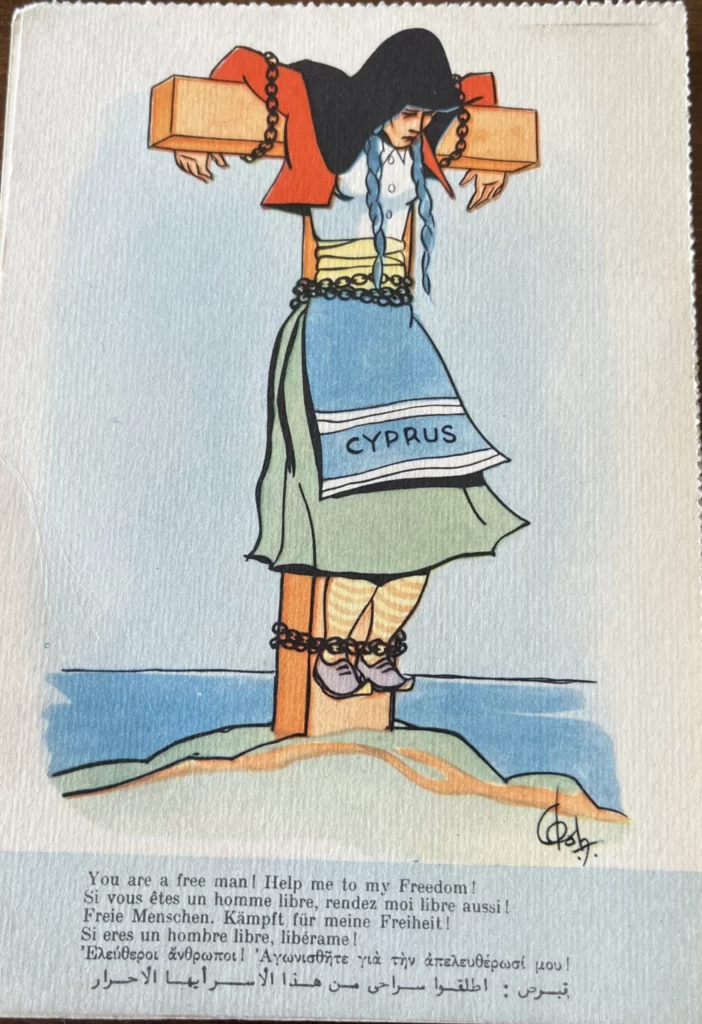“The night of 31st March to 1st April 1955 was a serene spring night filled with the delicate fragrance of blossoming lemon trees. In every other sense, it was an ordinary night.” This is how Elenitsa Serafim Loizou, later sector head of Larnaca and a key fighter, begins her book on EOKA . On that same Thursday night, from 31st March to Friday, 1st April 1955, the largest Cypriot cities were rocked by bomb explosions placed in various government buildings.
Based on a statement by the British authorities, 16 bomb attacks were recorded that night. Nearly half — seven — occurred in Nicosia. EOKA operated in all four large cities, as well as in rural areas nearby, such as Dhekelia and Episkopi. The first strike in Nicosia, according to newspapers, took place at 12:35 a.m., while in Larnaca explosions were heard at 12:42. In Famagusta and Limassol, attacks were recorded at 1:25 and 1:30 respectively. It is clear that the plan aimed at completely catching the British by surprise, with simultaneous strikes in the four large cities and a concurrent power outage.
In Nicosia, the attacks began with the government radio station, now known as CyBC (Rik), in Athalassa. This was the most impressive commando operation of the night. The official police report stated that “four masked men, armed with pistols and knives, entered the radio station, overpowered and tied up the guards.” This was followed by a dynamite explosion and fire that caused extensive damage. Other targets in Nicosia included the Wolseley Barracks, the Secretariat offices, and the Military Radio Station in Lakatamia. The next night, EOKA continued its attacks in the capital with dynamite explosions and homemade grenade attacks on British military homes, buses, and vehicles.
In Larnaca, proportionally speaking, the most successful outcomes were recorded. Targets included the city’s police headquarters, the District Office, the home of the Chief of Police and the nearby house of the District Commissioner, and the Courthouse. Larnaca also saw EOKA’s greatest losses, as key members Stavros Poskotis, Georgios Lykourgos, Michalis Paridis, and others were arrested, temporarily halting the organisation’s activities.
In Limassol, central targets were the Central Police Station, which suffered three explosions with minor damage, and the Ayios Ioannis Police Station, which was similarly attacked. In another operation, three armed men immobilised the civilian staff at the Episkopi Station and caused damage. However, in both Limassol and Famagusta, the results of the first night were minimal.
In Famagusta, there were small “dynamite explosions” near the British army camp on the Famagusta–Larnaca road. An attempt was also made to set fire to oil tanks at the Dhekelia power station. According to the police, on the morning of 1st April, Modestos Panteli, aged 28, from Liopetri, was found dead near the village of Avgorou due to electrocution “while attempting to cut an electric cable.” Directly related to the Famagusta attacks was the police proclamation published in most Cypriot newspapers on Tuesday, 5th April, naming Grigoris Pieris Afxentiou of Lysi as the first wanted man. The reward for his capture was £250.
The police bulletin issued on 1st April and published the next day in the Cypriot press also mentioned the distribution of typed proclamations in Greek, “said to have been thrown from cars shortly after the explosions in Nicosia.” What is remarkable, considering the heavy British censorship that followed in the years to come, is that the police report reproduced the entire revolutionary text of EOKA’s first proclamation. Thus, through the newspapers of 2nd April 1955, the proclamation reached every Cypriot home. Meanwhile, according to police statements, on the night of 1st April, slogans such as “EOKA,” “Enosis,” and “British out” were found painted on walls and roads in Limassol.
Let’s now briefly look at the political reactions. In Cyprus, Archbishop Makarios C’, as expected, made no comment. On the other hand, Governor Robert Perceval Armitage, in statements made a few hours after the explosions, struggled to hide his concern. The official announcement stated that His Excellency the Governor said that all necessary measures would be taken to detect and arrest the criminals, and that he was certain that the Cypriot people, being serious and law-abiding citizens, shared the authorities’ abhorrence and sorrow for such terrorist attacks and would neither encourage nor condone them.”
The only political faction to condemn the “terrorist attacks” almost immediately was AKEL, doing so in the early hours and again a few days later, followed by PEO. AKEL’s statement condemned those who chose “individual terrorism” as a means of struggle, emphasising instead the need to form a “united patriotic front.”
In Athens, the Greek government refrained from commenting on the explosions in Cyprus. Notable among official British reactions was the strong expression of displeasure and the protest by the British Embassy in Athens to Foreign Minister Stefanos Stefanopoulos on 4th and 5th April 1955 over the tone of Cypriot broadcasts on Greek radio. Stefanopoulos reiterated that the Papagos government “was against violence and would not allow the disruption of friendly and allied relations with Great Britain.” Already, on 3rd April 1955, the American Ambassador in Athens had stated that no one could doubt the United States’ support for the principle of self-determination, adding that “this is an inappropriate time to raise the Cyprus issue.”
If we are to believe what Lawrence Durrell describes in his book Bitter Lemons, on the morning of 1st April 1955, after the explosions, everything in Nicosia appeared to carry on as usual. Shopkeepers were lifting their shutters and sipping their morning coffee lazily, as on any other day. Yet, he adds, they had reached a limit. From then on, it was about holding on. Who would “hold on” and how the struggle that had begun at 12:35 a.m. on 1st April 1955 with the explosion at the State Radio Station in Athalassa would unfold—no one could have foreseen that morning.

By Petros Papapolyviou
Associate Professor Petros Papapolyviou is Dean of the Faculty of Philosophy at the University of Cyprus


